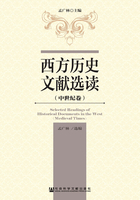
On Feudal Obligations
1. Fulbert of Chartres: On Feudal Obligations
To William most glorious duke of the Aquitanians, bishop Fulbert the favor of his prayers.
Asked to write something concerning the form of fealty, I have noted briefly for you on the authority of the books the things which follow. He who swears fealty to his lord ought always to have these six things in memory; what is harmless, safe, honorable, useful, easy, practicable. Harmless, that is to say that he should not be injurious to his lord in his body; safe, that he should not be injurious to him in his secrets or in the defenses through which he is able to be secure; honorable, that he should not be injurious to him in his justice or in other matters that pertain to his honor; useful, that he should not be injurious to him in his possessions; easy or practicable, that that good which his lord is able to do easily, he make not difficult, nor that which is practicable he make impossible to him.
However, that the faithful vassal should avoid these injuries is proper, but not for this does he deserve his holding; for it is not sufficient to abstain from evil, unless what is good is done also. It remains, therefore, that in the same six things mentioned above he should faithfully counsel and aid his lord, if he wishes to be looked upon as worthy of his benefice and to be safe concerning the fealty which he has sworn.
The lord also ought to act toward his faithful vassal reciprocally in all these things. And if he does not do this he will be justly considered guilty of bad faith, just as the former, if he should be detected in the avoidance of or the doing of or the consenting to them, would be perfidious and perjured.
I would have written to you at greater length, if I had not been occupied with many other things, including the rebuilding of our city and church which was lately entirely consumed in a great fire; from which loss though we could not for a while be diverted, yet by the hope of the comfort of God and of you we breathe again.
2. William I: Summons for Military Service
William, king of the English, to Aethelwig, abbot of Evesham, greeting. I command you to summon all those who are under your charge and administration that they shall have ready before me at Clarendon on the octave of Pentecost all the knights that they owe me. Come to me likewise yourself on that day, and bring ready with you those five knights that you owe me from your abbey. Witness, Eudo the Steward. At Winchester.
3. Henry I: Grant Concerning Scutage
Henry, king of the English, to his archbishops, bishops, abbots, earls, etc., greeting. Know that to the church of St. Aetheldreda of Ely, for the love of God, for the souls of my father and mother, for the redemption of my sins, and on the petition of Hervey, bishop of the same church, I have forgiven £40 of those £100 which the aforesaid church was accustomed to give for scutage whenever scutage was assessed throughout my land of England; so that henceforth forever the church shall on that account give no more than £60 when scutage is levied throughout the land. And so let the aforesaid church be quit in perpetuity of the aforesaid pounds.
Witnesses: Roger, bishop of Salisbury; Geoffrey, my chancellor; Robert, [keeper] of the seal; William de Tancarville; William d'Aubigny, steward; Ralph Basset, Geoffrey de Clinton, William de Pont-de-l'Arche. At Eling during my crossing.
一 文献来源
B. Tierney, ed.,Sources of Medieval History,Vol.1, New York, 1970, pp.111-113.
二 文献导读
这是三份涉及中世纪西欧封君封臣关系的文件。第一份是1020年法国北部的查特雷主教福尔伯特给阿奎丹公爵威廉五世的信件,其中陈述了他对封君封臣关系之要旨的理解。第二份是英王威廉一世(1066~1087年在位)所颁布的征调封建军役的令状,封建军役是封臣向封君应尽的主要封建义务。第三份是英王亨利一世(1100~1135年在位)对教会封臣所颁的缴纳“盾牌钱”以取代军役的令状。
自法兰克王国的墨洛温王朝起,西欧大陆开始了封建化的过程。经过近5个世纪的演进,到了10世纪,封建制度作为一种社会形态在西欧大多数地区盛行开来,而封建主阶级内部的等级制度——封君封臣制,就是其中的一个重要组成部分。
所谓的封君封臣制,就是以土地的层层分封、占有为基础,以封君和封臣之间的权利和义务关系为纽带的封建等级制。首先是国王将全国的土地留下一部分作为王领后,将其余的分授给大封建主,国王成为封君,被分封的人就成为封臣。大封建主在获得土地以后,也将其中一部分划为自己直接经营的领地,其余的则再对中等贵族进行分封,大封建主也成为封君,而受封者也成为封臣。这一级封臣也将部分土地分封给骑士,让其作为自己的封臣。这样,在各个等级之间都缔结起了相互统属和依附的封君封臣关系。
封君封臣之间结成这种关系时,要举行相关仪式。在封君行分封前,封臣要向封君行臣服礼——封臣必须跪下,不带武器,合掌置于封君手中,表示愿意依附封君,成为其封臣。臣服礼后再举行宣誓效忠仪式,即封臣站着,把手放在《圣经》或圣物上,然后,封君要亲吻封臣的额头,并将具有象征意义的树枝或泥土交给封臣,表示对其封土的授予。封臣死后,其子需重新行臣服礼,以继续领有封土,从而使主从关系世代相传。从理论上讲,封君对土地拥有授予权,而封臣只有使用权,而且在死后必须归还。但现实与之大相径庭,封君很少真正收回土地,因为多层分封使得封臣封君之间的关系错综复杂,而且土地零散,封君要收回土地比较麻烦。所以,封土在维持一定时期后,逐渐转变为可以继承、转让、买卖的私人财产,但封臣对封君的隶属身份基本不变。
各个层级的封君封臣的关系一旦形成,双方就有了封建的权利和义务。封君对封臣要尽一些义务:维持封臣的生计,确保封臣对土地财产的享有;保护封臣的人身安全,封臣如果处于危险中,封君必须出面相救;封臣陷入官司纠葛中,封君应该为封臣在法庭上讨回公道;维护封臣的社会名誉,如其遭到污蔑和诋毁,封君要为其澄清和辩护;等等。封臣应对封君履行的义务则更多。他必须效忠于封君,保证封君安全,不能疏于防卫;不能在司法审判上做有害封君名誉的事情;更不能随意反叛,加害封君的身体和财产。除此之外,封臣还需要履行三项主要的义务。其一是提供军役。封臣每年都要为封君服兵役,自备兵甲和粮草,或跟随其从事征战,或为之驻守城堡、要塞或边境。这样的服役有时间限制,在12世纪一般为每年40天。40天之外的服役则由封君提供一定的报酬。从12世纪开始,在英、法等国,国王开始征收“盾牌钱”来取代封建军役,这项义务也就改为由货币支付。其二是支助,即给予封君“协助金”以示资助。尤其是在一些特殊的场合,如封君的长女出嫁、长子晋封为骑士以及封君的远行等,封臣都须提供经费资助。而当封君在战场上或其他地方被俘或被扣押作为人质时,封臣也必须筹措赎金赎回主人。其三是劝告与做证。封臣必须向封君的事务提供好的建议或劝谏,使封君做出最合理的判断。此外,封臣还必须出席封君的法庭,在其司法审判中充当证人,或帮助封主仲裁与其他封臣之间的诉讼。
封君与封臣的权利和义务关系是通过双方的约定(不少是口头约定)来缔结的,久而久之就成为封建习惯。如果一方未履行应尽的义务,约定就自动解除。从表面上看,这一约定是约束双方的,但实际上,这却是一种不平等的人身统属和依附的关系。如果封臣不效忠或反叛,封君就有权扣押封臣及其家属,收回其所得的封土。不过,如封君不履行其义务,封臣即可摈弃对主人的效忠,而对封君的侵害,封臣也可予以抵抗。当然,双方关系处于什么状态,常常是由双方的实力对比所决定的。拥有人力和物力之资源优势的封君,大多处于支配的地位。
在西欧大陆,由于土地是层层分封的,附庸只承认分封自己的人为封主,与自己封主的封主则没有臣属关系。所以,在西欧出现了“我的附庸的附庸不是我的附庸”的现象。这种情形使封建等级制度复杂而混乱。如封建主甲可以是乙的封主,而乙的封臣又可以是甲的封君,往往一个封建主又有多个封臣,从而加剧了封建主之间的争夺和冲突。为了克服这一局限,在1066年的诺曼征服后,英国的君主将其从诺曼底引进的封建制加以改造,要求所有大小封建主向其效忠,形成了“我的附庸的附庸也是我的附庸”的局面。此外,在德意志地区,由于封建化启动较晚且不充分,并未形成以君主为“塔尖”的层层分封统属和依附的等级制。
西方人常常把封君封臣制等同于“封建制度”(feudalism)。但从唯物史观来看,封建制度或封建主义是人类社会发展过程中的一种社会经济形态、一个历史阶段。大土地所有制和农民小生产的结合及其所形成的人身依附体制,是封建制度的基本特征。因此,封建制度既包含着各级封建主之间的尊卑贵贱的等级关系,即封君封臣制,也包含着封建主与农民之间的阶级对立关系。
三 延伸阅读
Bloch,M.,Feudal Society,translated by L.A.Manyon,Chicago,1961.
Ganshof,F.L.,Feudalism,London,1952.
Reynolds, S.,Fiefs and Vassals:The Medieval Evidence Reinterpreted, Oxford, 1994.